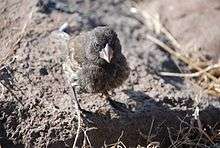Española cactus finch
| Española cactus finch | |
|---|---|
 | |
| On Española Island, the Galápagos Islands, Ecuador | |
| Scientific classification | |
| Kingdom: | Animalia |
| Phylum: | Chordata |
| Class: | Aves |
| Order: | Passeriformes |
| Family: | Thraupidae |
| Genus: | Geospiza |
| Species: | G. conirostris |
| Binomial name | |
| Geospiza conirostris Ridgway, 1890 | |
The Española cactus finch (Geospiza conirostris), is a species of bird in the tanager family Thraupidae. It is one of Darwin's finches, and is endemic to the Galápagos islands, where it is restricted to Española, Genovesa, Darwin and Wolf Islands. This rather dark bird resembles the smaller and finer-beaked common cactus finch, but the two species do not co-inhabit any island.
Its natural habitat is dry shrubland and it is commonly seen on the ground. Its main food source is the cactus Opuntia.
Taxonomy
The Española cactus finch is one of Darwin's finches, a group of closely related birds which evolved on the Galápagos Islands. The group is related to the Tiaris grassquits, which are found in South America and the Caribbean.[2] An ancestral relative of those grassquits arrived on the Galápagos Islands some 2–3 million years ago, and the large cactus finch is one of the species which evolved from that ancestor.[3] From a study done in 2015, the large ground finch (G.c. conirostris) of Espanola was found to be a sister to the large ground finch, not to Genovesa cactus finch. (Lamichhaney et al. 2015). The International Ornithologists' Union has changed the taxonomy based on the study. Other taxonomic authorities have kept the large cactus finch and the Genovesa cactus finch conspecific.
Description
The Española cactus finch is among the largest of the Darwin's finches, measuring 15 cm (5.9 in) in length. The male is black, with white-tipped undertail coverts. Female and immature birds range in color from dull gray to matte black, and frequently show white edges to the feathers of their underparts.[4]
 Female on Española
Female on Española Male on Española
Male on Española
References
- ↑ BirdLife International (2012). "Geospiza conirostris". IUCN Red List of Threatened Species. Version 2013.2. International Union for Conservation of Nature. Retrieved 26 November 2013.
- ↑ Newton, Ian (2003). Speciation and Biogeography of Birds. San Diego, CA, USA: Academic Press. p. 78. ISBN 978-0-12-517375-9.
- ↑ Grant & Grant (2008), p. 25.
- ↑ Swash, Andy; Still, Rob. Birds, Mammals, and Reptiles of the Galápagos Islands: An Identification Guide (2nd ed.). London, UK: Christopher Helm. p. 104. ISBN 978-0-300-11532-1.
Cited works
- Grant, Peter R.; Grant, B. Rosemary (2008). How and Why Species Multiply: The Radiation of Darwin's Finches. Princeton, NJ, USA: Princeton University Press. ISBN 978-0-691-13360-7.
- Jobling, James A. (2010). Helm Dictionary of Scientific Bird Names. London, UK: Christopher Helm. ISBN 978-1-4081-2501-4.
External links
| Wikimedia Commons has media related to Geospiza conirostris. |
